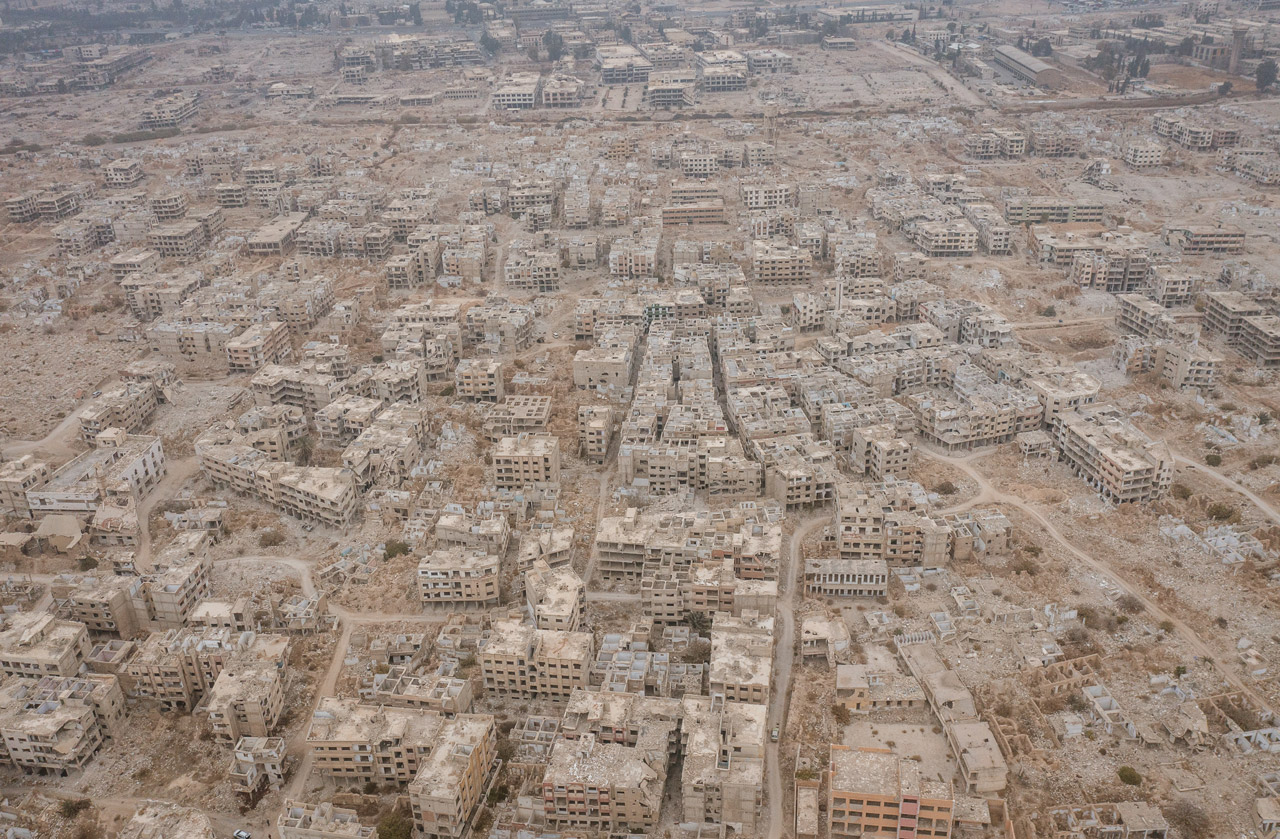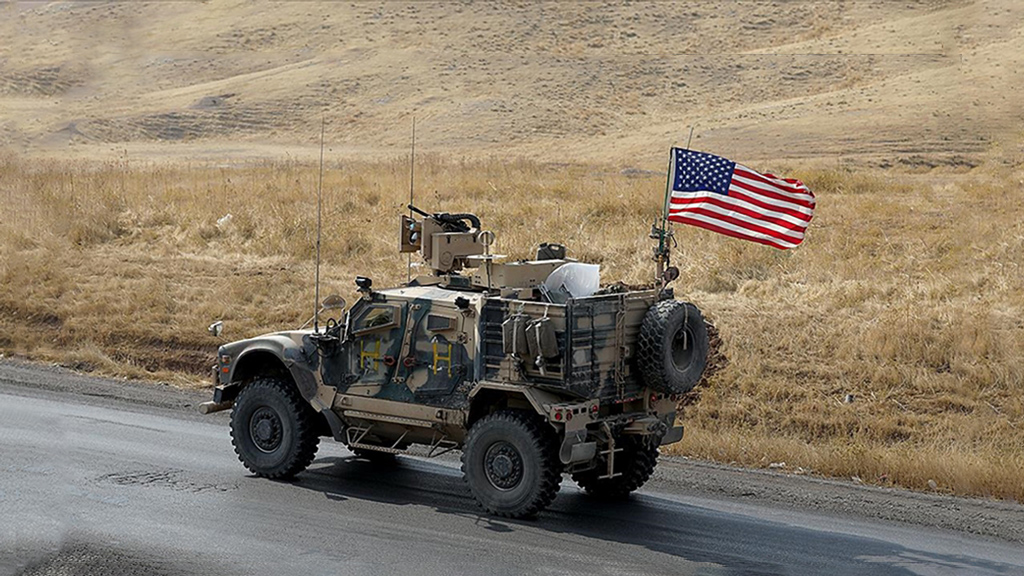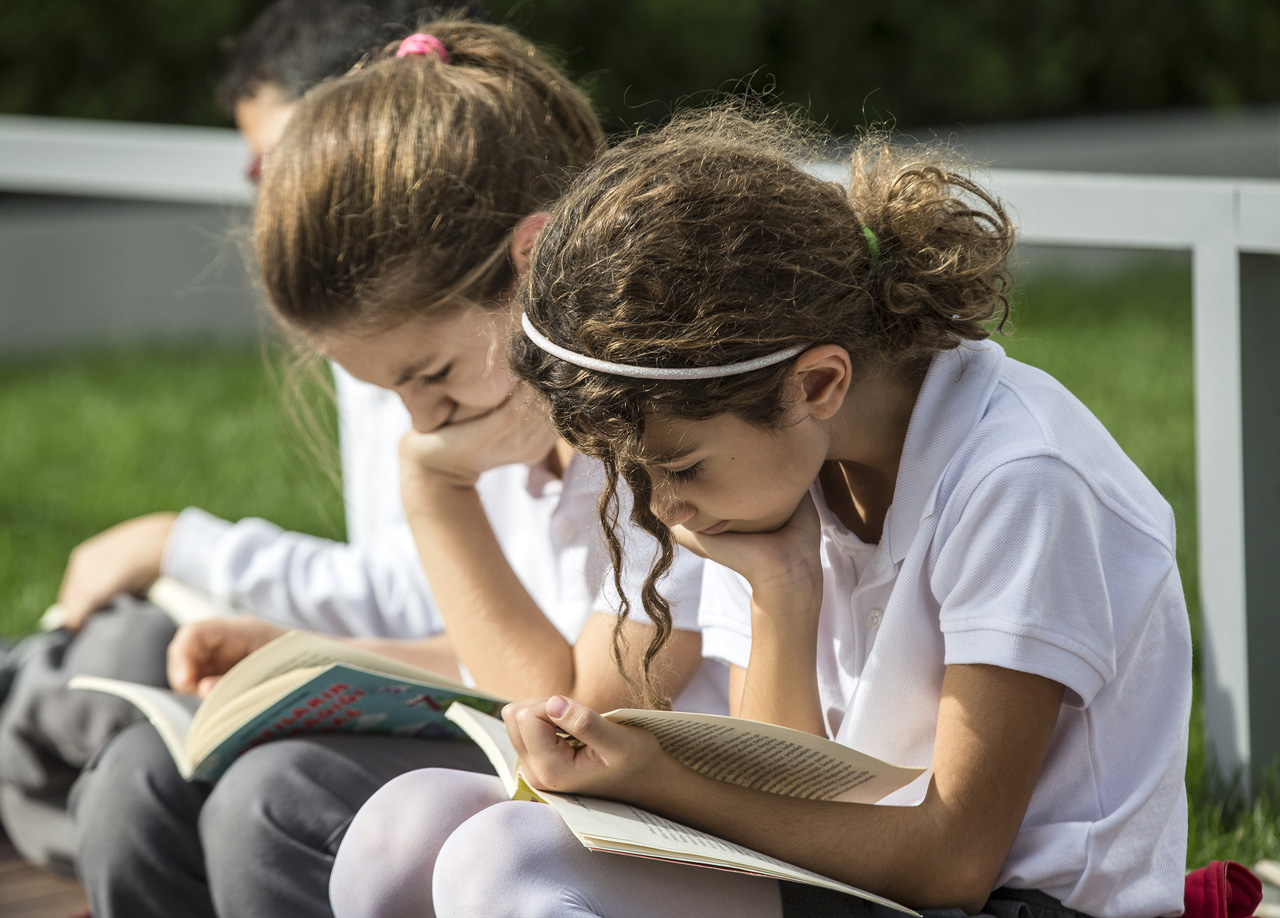
Erdoğan: Israel's actions against Palestinians undermine world peace
Israel's occupation of Palestine and constant attacks to the unarmed civilians prove the harm the country causes to the World peace, President Recep Tayyip Erdoğan said
Share
Israel's decades-long indiscriminate violence against Palestinians in the occupied territories damages world peace, President Recep Tayyip Erdoğan Thursday told members of Turkish press accompanying him during his visit to New York, for the 74th United Nations General Assembly. "There is no way that Israel contributes to world peace," Erdoğan said and added: "Unfortunately, it [Israel] kills everyone, including children." The president also referred to the latest incident where Israeli forces killed an unarmed Palestinian woman last week. "I've told them [the Jewish institutions' representatives] that a woman, who did not have any weapons or knives, has been killed. Do you know how they responded to me? They said there is no such thing. I showed them the video of the shooting immediately and asked: 'If you still can't see it, what more can I do?'" Erdoğan said, adding that he has also accused Israeli authorities of killing and harming children, one of whom he had visited himself before.
There is nothing Israel has to say about this (the killing of innocent civilians), he added, pointing out that even in the presence of facts, they managed to deny this reality somehow. Regarding the borders of Israel and its occupation of the Palestinian territories, Erdoğan reminded that the map he displayed during his U.N. speech has "driven Israelis crazy," as can be seen by Israeli Prime Minister Benjamin Netanyahu's statements that followed. "I brought this issue to the table during the meeting with the Jewish institutions' representatives as well. I told them that they are occupiers. 'Where were you back in 1947-1948?' I have shown them the map and told them: 'Look, you were right there. After this period, Palestine shrank and you have widened. How? With occupation," the president said, indicating that today's Israel is the same size as Palestine was in 1947-48.
Israel occupied the West Bank, including east Jerusalem, during the 1967 Arab-Israeli War. It annexed the entire city in 1980, claiming it as Israel's "eternal undivided capital," a move never recognized by the international community. International law views the entire West Bank as "occupied territory" and considers all Israeli settlements built there to be illegal.
The president also said that he accused the representatives of banishing Muslims from the Al-Aqsa Mosque. "You damaged our holy book on the floor. You broke the windows. Will you deny this as well?" he asked, adding that due to these experiences, Muslims are now afraid to go to the building in comfort since there is an ongoing nervousness.
Erdoğan also mentioned a personal experience of his during a visit to Tal Aviv, the Israeli capital at the time when he was prime minister. "It was an official visit. My wife was with me. We were about to cross the border [toward the Palestinian side]. They had me wait for about half an hour. You are making a prime minister, a prime minister of a country like Turkey, wait at the border for half an hour," he said. Stating that he asked the authorities how such actions can fit into international diplomacy, Erdoğan said that once again he failed to receive a response to his question since there are no answers for such an act. "This is Israel," the president said.
Turkey has been welcoming prominent Palestinian figures who have suffered mistreatment by Israeli officials.
Last year, 29-year-old Mohamed al-Tawil, a young Palestinian with Down syndrome, who was detained for an hour by Israeli troops in Hebron, came to Turkey upon an invitation from the Health Ministry and was received by Erdoğan at the Presidential Complex.
UN summit an opportunity to bring world problems to attention
Evaluating his overall time at the summit, Erdoğan said that he had the opportunity to bring the issues that were generally overlooked by the international community to the agenda, from the Kashmir crisis to Yemen, from Rohingya to the Middle East.
"We are trying to be on the side of justice, consciousness, rightfulness and equity in both domestic and international matters," he said, adding that the country will continue to act this way and mention the truth in every platform possible.
"I believe that in both my speech in the general assembly and during bilateral meetings, we have given important messages. We can summarize these as follows: the main problem of the global order is injustice and the production of inequality. We have to build a world system that is in accordance with human honor," Erdoğan said, adding that that's why in every platform he reminds that the world is bigger than five.
Underlining that one of the biggest crises that the world is facing right now is migration flows, Erdoğan said the world is still ignoring it and is focusing on other issues.
"In order to direct their attention to this issue, I've shown the picture of baby Aylan Kurdi. We need to stop the bloodshed in Syria in order to solve the refugee problem from its roots," he added.
Recapturing Turkey's efforts for Syria, Erdoğan mentioned both the Geneva and Astana processes, saying that the country is making remarkable efforts for a political solution.
"It is a significant step to form the constitutional committee. The work of the committee should start as soon as possible," he said, regarding the biggest outcome of the latest Astana summit held in Ankara a few weeks ago.
The Astana peace process, seeking to end the Syrian conflict once and for all, was launched in January 2017 on the initiative of Turkey, Russia and Iran. At a summit on Syria with Russian and Iran hosted by Turkey earlier this month, Erdoğan said the participants would urge the constitutional committee to begin work as soon as possible. Regarding the issue, the U.N. envoy for Syria Geir O. Pedersen said on Tuesday the agreement to establish a constitutional committee is an important first step and "a door opener" to eventual U.N.-supervised elections and a new future for Syria.
Safe zone a must for Turkey's national security, refugees
When it comes to the formation of the safe zone, Erdoğan said that in order to protect Turkey's national security and the refugees, the zone should be established immediately.
"I've shared our preparations on this issue with our addressees. I even distributed the booklets that we have prepared on this issue to all the leaders. If this safe zone can be formed, we can resettle 1-2 million refugees to these areas," he said, adding that several ministries have already given start to the projects on the issue. The president said that the safe zone plan has a length of 480 kilometers, which also includes the U.S.' offer of a 20 mile-long safe zone. He added that the plan is to make buildings in areas with size ranging from 150 to 400 square meters with gardens for agriculture as well as barns for animal husbandry.
"We want to save these people [refugees] from shelters, tents," he highlighted.
However, Erdoğan also indicated that the support of other countries, especially the U.S., Russia, Germany and France is a must for the safe zone. "If this support comes, we can take the burden regarding the construction and complete the work quickly," he said.
"I would like to underline a point in here: Security and the fight against terrorism is a whole. The double standard [against one or another] cannot be accepted. None of us are safe until all of us are safe," the president expressed.
Earlier on Aug. 7, Turkish and U.S. military officials agreed to set up a safe zone in northern Syria and develop a peace corridor to facilitate the movement of displaced Syrians who want to return home. They also agreed to establish a joint operations center.
The agreement also envisaged setting up necessary security measures to address Turkey's security concerns, including clearing the zone of PKK-affiliated People's Protection Units (YPG), a group the U.S. has sometimes allied with, in spite of Turkey's objections.
The two countries are working together and taking steps toward the establishment of the planned safe zone. However, Turkish officials have frequently voiced concerns that the U.S. moves are advancing too slowly on this issue. The joint process with the U.S. regarding the formation of a safe zone seems to be ongoing right now, Erdoğan said, adding that since planes are already flying over the area, it is clear that the process is continuing.
"Still, as soon as I return [to Turkey], we will implement our plans and figure out which steps we will take following an evaluation process. Because, Turkey is not a country to stall," he said, referring to the country's ongoing lack of trust for the U.S., caused mainly by previous experiences, as well as the NATO ally's support for YPG terrorists.
Reminding the media that Turkey is hosting 4 million Syrian refugees, Erdoğan said that west remains silent when it comes to this issue. "They are all part of the audience," he said, adding that the promises given have yet to be met.
"Back in 2016, they promised us 6 billion euros for the refugees. They told us that they will pay in two installments. Yet, they only paid 3 million euros," the president said, adding that Turkey has spent $40 billion on the refugees by itself.
Idlib is in peace now, yet, one still needs to be cautious
Regarding the conditions in northwestern province of Idlib, which has been suffering from regime attacks despite the declared de-escalation zone, Erdoğan said that currently the province seems to be in peace but still, it would be wise to be cautious. "If we loosen the ties, a new refugee flow might have come to our borders. Now, all of those refugees have settled in tents there," he said, adding that Turkish institutions such as the Disaster and Emergency Management Presidency (AFAD) provide humanitarian aid to these refugees.
Turkey and Russia agreed last September to turn Idlib into a de-escalation zone where acts of aggression are expressly prohibited. The Syrian regime and its allies, however, have consistently broken the terms of the cease-fire, launching frequent attacks inside the de-escalation zone. The zone is currently inhabited by about 4 million civilians, including hundreds of thousands of people displaced from cities and towns throughout the war-weary country.
Hosting nearly 4 million refugees, Ankara often warns the international community and regional countries that a new offensive could trigger an unbearable refugee wave toward the West.
F-35 problem with U.S. still not resolved completely
Regarding the trade volume with the U.S., the president said that although the details of any agreements with the NATO ally would be determined through negotiations between the trade ministers of the both countries, the target of the trade volume has been raised to $100 billion from $75 billion.
Underlining that negotiations are continuing, Erdoğan said that some important things have already been achieved since, for instance, the tariffs of the exported steel from Turkey had been reduced. "We have been working on what else can be achieved," he said.
When it comes to the F-35 issue with the U.S., Erdoğan said that it cannot be said the problem has been solved completely.
"I've made my offer to them. I've told them that apart from S-400, we can buy Patriots from you as well. I've told this personally to Trump. He said that if this is a serious offer, they will work on it." He further added that any offer that would come from the U.S. should not be less than what Russia has offered for the S-400s. "If there would be such an offer, than we would enable Turkey to have an alternative defense system," he said.
In July, the U.S. suspended Turkey's involvement in the F-35 fighter jets program, saying the latter's purchase of the Russian S-400 missile defense system could endanger the aircraft, a claim Turkey has consistently denied. Turkey produces some parts of the F-35 jets and is also a partner in the jet program. It has warned any effort to remove it from the production chain would be very costly.
After protracted unsuccessful efforts to purchase Patriot missiles from the U.S., Turkey signed a deal with Russia in April 2017 to acquire the Russian air defense system.
In response to U.S. concerns, Turkey has emphasized that the S-400 would not be integrated into the NATO systems and therefore had no chance to pose any threat to the alliance or its armaments. Turkey even proposed setting up a commission to clarify any technical issues. However, the U.S. has yet to respond to the proposal. As far as the Iran sanctions are concerned, Erdoğan said that Turkey is determined to continue trading with Iran and even offered to trade in national currencies.
"It is not possible for us right now to minimize our trade relations with Iran especially, when it comes to oil and natural gas," the president said, adding that the current trade volume with the country is $7.5 billion, while the target is $30 billion.
The confrontation between archenemies Iran and the U.S. has ratcheted up after attacks on Saudi oil facilities on Sept. 14 that Washington, the EU and Riyadh blame on
Tehran, in spite of its denial of involvement.
CHP aims to damage AK Party with IMF move
As far as the domestic politics is concerned, Erdoğan mentioned the main opposition Republican People's Party (CHP)'s attempt to approach to the IMF with a claim to "contribute" to the country's economy.
Reminding the media that when the ruling Justice and Development Party (AK Party) came to the power in 2002, there was $23.5 billion debt to the IMF, Erdoğan said that in the May of 2013, the debt was completely eliminated. "Even the IMF came with a demand of $5 billion. We told them that we can lend the money. However, when they saw that we were serious about it, they backed down," he said, adding that Turkey has never thought of borrowing money from the IMF during the AK Party era.
"Yet," he indicated, "the opposition looks to harm the ruling party and thus continuously lies and slanders," the president said.
Arriving for a visit as part of the fund's Article IV consultation, an annual economic assessment of each of its member countries, IMF officials, although not in the official program, met with representatives of the CHP and Good Party (İP), reports said over the weekend.
The reported participants included former central bank governor and current İP member Durmuş Yılmaz, as well as the CHP's Deputy Chairman responsible for economic policies, Faik Öztrak.
AK Party spokesman Ömer Çelik condemned the opposition for claiming "the government would make a deal with the IMF" and "then secretly meeting with them."
He also reminded the media the first time that Turkey had to apply to IMF was also during the CHP period of rule and said that the same vision still lingers within the party.
"I do not mind why they wanted to have such a meeting. However, why they are being secretive about it? There is no need for such a thing," he said.
Tags »
Related Articles






